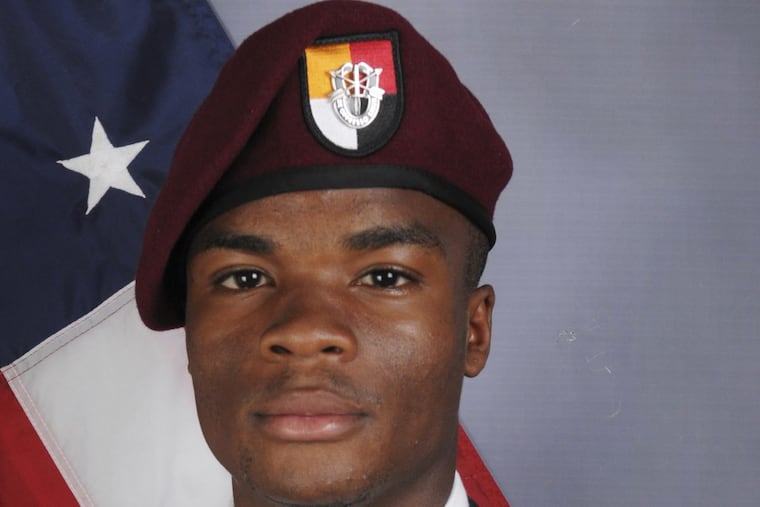More remains belonging to Sgt. La David Johnson found in Niger, military says
An investigation team from U.S. Africa Command discovered the remains Nov. 12 at the site where Johnson's body was initially found outside the remote village of Tongo Tongo, where he and the other soldiers were killed during a fierce attack by as many as 50 Islamist militants.

Partial remains of Army Sgt. La David T. Johnson were found about five weeks after he was killed in an ambush in Niger last month, the Pentagon said Tuesday, raising more questions about the operation that led to the deaths of four elite U.S. soldiers.
An investigation team from U.S. Africa Command discovered the remains Nov. 12 at the site where Johnson's body was initially found outside the remote village of Tongo Tongo, where he and the other soldiers were killed during a fierce attack by as many as 50 Islamist militants.
Along with Johnson, Staff Sgt. Bryan C. Black, Staff Sgt. Jeremiah W. Johnson, Staff Sgt. Dustin M. Wright, and five Nigerien soldiers were killed. About 12 U.S. soldiers and about a platoon of Nigerien troops were involved.
The announcement of Johnson's remains, which were somehow missed in the initial sweep, comes after the Washington Post reported that Johnson was found by villagers with his hands bound and a gaping wound in his head, raising the possibility that he was captured alive and later executed. His body was discovered two days after the attack. It is unclear what remains the team uncovered or whether they produce additional evidence indicating a capture. Pentagon spokesman Dana White disclosed the information in a written statement. The Pentagon has not provided additional details or addressed related questions.
The announcement also paints a clearer picture in the saga over Johnson's remains and what his widow, Myeshia, described as the military's decision to block her from viewing them.
"Why couldn't I see my husband? Every time I asked to see my husband, they wouldn't let me," Myeshia Johnson said in an interview with ABC's Good Morning America. "They told me that he's in a severe wrap – like I won't be able to see him. I need to see him so I will know that that is my husband."
"They won't show me a finger, a hand. I know my husband's body from head to toe, and they won't let me see anything. I don't know what's in that box. It could be empty for all I know, but I need to see my husband. I haven't seen him since he came home."
The Pentagon has said that the soldiers were on a routine reconnaissance mission. Under U.S. military rules, American troops in Niger are not supposed to go on combat missions in the country, but they can "advise and assist" on missions with local forces in which the chance of enemy contact is low.
Air support from French Puma helicopters and French jets took an hour or longer to arrive. The incident, still under investigation, has put pressure on the Pentagon to explain whether U.S. troops in remote and dangerous postings like Niger have acceptable levels of air support and medical evacuation capabilities.
There are about 800 U.S. service members in Niger – part of a contingent of 6,000 American troops in Africa. They include Special Forces soldiers, who began arriving in 2012 to provide counterterrorism training, as well as others who work on a drone base in the remote desert. About 4,000 French troops also are based in the region.
The Washington Post's Sudarsan Raghavan contributed to this article.